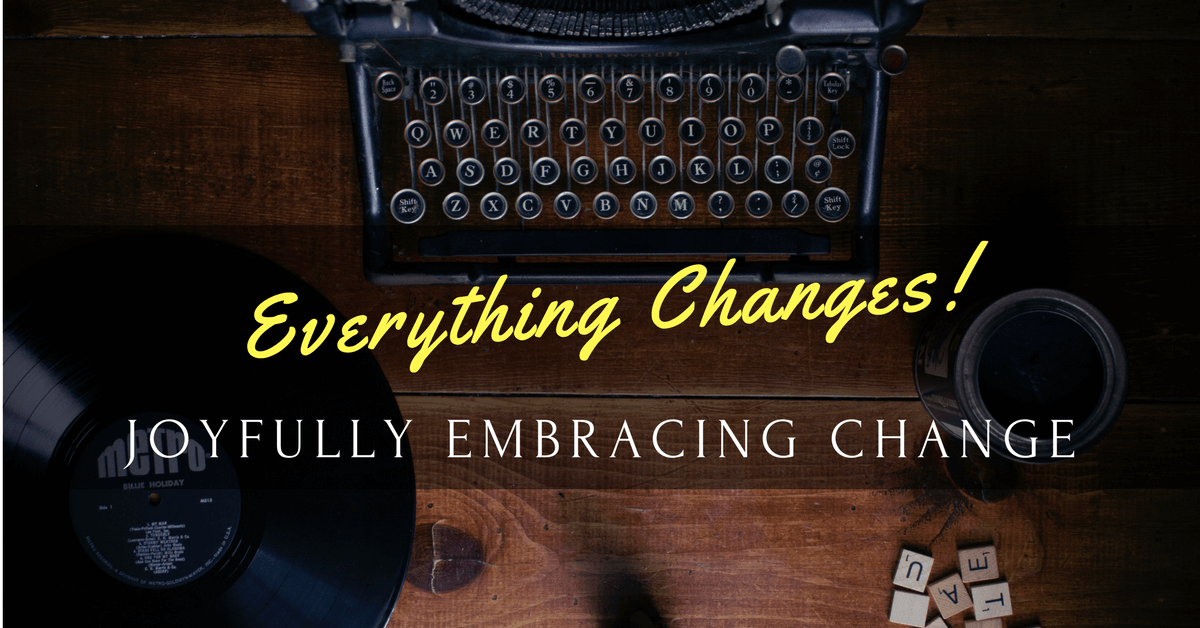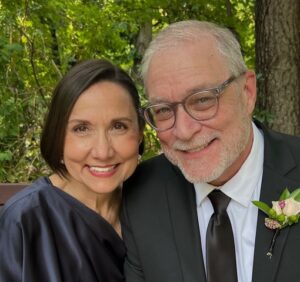
Podcast: Play in new window | Download
Joyfully Embracing and Navigating Change
Change is a part of life and the way we face it, embrace it, and navigate it will determine the difference between an effective and joyful life and a life held captive by circumstance. Change is an opportunity for transformation, but change is also losing something or someone that makes us feel secure and comfortable. Change has to happen, not only because we have to move forward, but because nothing stays the same. We go to the next level in our lives when we face change with the right attitude and actions. When we successfully navigate the changes in our lives, especially the difficult changes, we go to the next level in joyful living, leading, and loving.
This episode of the Calibrate Life Podcast with David and Donna explores the importance of change and the actions and attitudes necessary to navigate even the most difficult changes in our lives.
To read the article and the time-stamped episode notes, continue reading.
Joyfully Navigating and Embracing Change
[4:35] God is unchanging, it is one of his attributes. He is a rock, an anchor, he is consistent in his principles and actions. But even though God does not change, he is always transforming us and the world around us. Transformation is change.
[5:30] Calibrate360 and the Calibrate Life Podcast is about transformation. In fact, one of our embraced values reminds us that everything we do and talk about must be transformational. That is our litmus test when considering what to write about, talk about, and podcast. Will this be transformational and what is the transformation we are expecting.
Transformation is going from one form to another. It is the ongoing changes taking us to another place in our lives.
[7:06] 2 Corinthians 5.17 says, “Therefore, if anyone is in Christ, he is a new creation. The old has passed away; behold, the new has come. (ESV)” Transformation can take place in a moment and it will also be a long-term process of incremental change through calibration.
[9:05] I was talking to a leader a few days ago whose ministry is going through a lot of transitions and change. While he is the kind of leader who embraces change and is very forward thinking and progressive, yet the volume and substance of the change he is facing in this season is unsettling because there is just a lot of it happening at one time.
[10:30] When a lot of change happens at one time it causes anxiety. It creates situations demanding immediate attention. Every major transition, change, or transformation must be managed. Change management takes time, it is a process, it is a journey from present reality into a new future. A bridge must be built while we walk on it.
[12:37] There are two kinds of change that lead to transformation. There are the slow and steady changes that are barely perceptible, and there are the sudden changes that turn our worlds upside down.
[callout]There are two kinds of change that lead to transformation. There are the slow and steady changes that are barely perceptible, and there are the sudden changes that turn our worlds upside down.[/callout]
We have been managing monumental all-encompassing change for a few years now. This is our life. Neither of us are particularly fond of change, but we embrace the transformation it brings. The loss of a spouse throws you into a world of change.
[16:00] There are a lot of life circumstances that bring change, be it incremental or cataclysmic. How do we navigate change in both attitude and action.
#1 Realize that change is inevitable and it is happening all the time. [16:10]
You may be walking through a change that you resent. We often resent the changes we’ve had to face. One of the things I (David) have had to face is an emotion that cycles from anger to envy to self-pity. I see the posts on Facebook of the victorious family photo where a couple has been married for 50 years and they are surrounded by their kids, grandkids and family pets. It is celebratory because this is a visual of the benefit of working through 50 years of marriage with consistency. There is something to be envied in a very long-term and wonderful relationship.
I sometimes look at friends and colleagues and envy their position. They’ve known all of their kids since birth, they’ve come to a place in life that is relationally comfortable. They, their spouse, and their kids have been on the same path for decades. They have long-term relationships and those relationships are bearing fruit.
We have some challenges that present themselves only because our history is brief. Our lives changed. We don’t get to celebrate a 40th anniversary, ever. I won’t even elaborate all the things that painfully changed when our worlds changed.
[20:46] The change was violent.
You may be walking through a change that you didn’t ask for and you resent it and at times it makes you angry. It may be a failure of a project in your business, it may be a sudden financial reversal, it may be a ministry that is blowing apart, or worse, it may be the loss of a child or a relationship.
[22:00] Realizing and accepting change as inevitable and ongoing is an attitudinal change.
You have a unique set of circumstances and emotions to deal with if your change happened cataclysmically and suddenly, you have another set of circumstances and emotions if change is progressing in your life incrementally.
I’ve had to get over the self-pity, though I am not over it yet. Yes, our lives got broadsided and in some ways we are still sliding sideways down the highway, but we are not as unique as we sometimes think we are.
Everyone faces change. People are born, people die, people get sick, we gain employment, we lose employment, we have successes and failures. Our kids grow up, our businesses and ministries transition, we get old, we prepare for life and then we prepare for death.
Sounds a bit too philosophical, but this is not philosophy, this is life.
Change is happening in your life every day whether you like it or not.
#2 Realize that Change is the passing away of something and the gaining of something new. [23:46]
When something changes something dies. Odd concept. This is why most of us fundamentally do not like change. We may like the change the color of our walls, or tweak our structures, or try something new and exciting — those are the fun parts of change because that is the part where you gain something new.
Our spouses died and that brings sincere challenges every day of our lives. I honestly do not think the ramifications will ever end. On the other hand, both of us gained a new love. We are excited about what has been added to our lives. I’ve got two grandchildren, six new adult kids, and a beautiful wife that is precious that I dearly love.
[28:35] Change means something goes away. It is usually a circumstance to which we’ve grown accustom.
[28:50] Since change involves loss, the grief process applies. Think of the stages of grief (which most people can recite, but I am coming to believe that few understand).
- Denial
- Anger
- Bargaining
- Depression
- Acceptance
These five stages of grief are more than stages of grief, they are reflective of human nature and how we process change. Think about it.
[30:48] In the denial stage we deny the need for a change and we deny the eventuality of change. I deny that I cannot hear or see as well as I used to be able to. I deny the need to restructure my ministry or business because the way we’ve been doing it is fine and changing it will take too much work and may present a challenge to which I cannot rise.
[33:18] Anger is demonstrated when we push back. Being in church ministry I see this all the time. People get angry over the most insignificant changes. Employees get angry when they lose a benefit necessitated by a diminishing bottom line. In our country, the United States, and entitlement mentality has taken hold and people get angry if something the did not earn in the first place is taken away from them for the sake of the common good.
[33:55] Bargaining is when we try to make the change go away. Bargaining is seldom logical when it comes to grief or change. Change is inevitable and resurrection will only happen on resurrection day. We bargain to try to maintain the status quo.
[35:26] Depression comes when the shock wears off and the realities start to settle in. Relating this to change, we are often depressed because things have changed. Parents get older, the kids don’t come “home” for Christmas, kids move all over the world, life doesn’t look the way we planned. Depression is exacerbated when we do not embrace the beauty of what is added to our lives, but rather we focus upon what was taken away through change.
[36:40] Acceptance is when we come to embrace the loss or the change. We accept it as reality.
#3 Embrace the things that have been added to your life to ease the grieving of what was lost. [36:51]
This is acceptance.
I mentioned that embracing change, the new things in our lives, is part attitudinal and part action. the first two points, realizing that change is happening to everyone all the time and realizing that change involves both losing and gaining, are attitudinal points. You need to calibrate your attitude. You need to calibrate the way you are thinking about change.
These first two points remind us that life and everything it touches is constantly changing, not only for us, but for every one around us. We have not been singled out, we are not being punished, we are not losers who cannot win. We navigate those things common to man.
[37:34] I saw a recent article in Christianity Today by Rick and Kay Warren. Exemplary pastors who were probably the most influential pastors in America 10 or 15 years ago. With a desire to help others they have shared some of their deep marital struggles and how they walked through the difficulty.
[38:31] Our attitude needs to be one of victory. Others have walked the change path we are walking and they were victorious. We are living and we are dying and we need to embrace our lives and the change it brings.
The third point moves us from attitude to action.
We must accept the reality of change and the new future it brings. Every change means losing something, but every change also means you gain something. Focus on the gaining. Yes, you have to mourn, you must process, you must deal with internal hurt and depression, but the way we do that the best is progressing to acceptance. Progressing to the embracing of the lovely things.
This is where joy in living comes from. This is where we find happiness and contentment.
[39:37] If we stay where we are we will never get where we are going.
Clients come and go and as we grow, we more effectively build a client base.
Our ministry grows and transforms to accomplish things we thought beyond our reach.
Employees and staff come and go. Each departure may be painful and present challenges, but new additions can bring new life and new opportunities.
Contentment, in a way, is wanting things to stay the same. Part of my anger toward change was directed to my contentedness “before”. I was not looking for a change or wanting a change, but I got one.
Here’s the thing… transformation and the passing of old things and the coming of new things, can only happen if things are changing in us and around us. Whether you like it or not things will change. They will change negatively or positively in direct proportion to your engagement in the change. Ignoring things that need to change will cause things to change negatively.
Life is about ongoing transformation. If we embrace the new day, if we embrace inevitable changes, if we allow the changes to positively transform us as a part of God’s plan and purpose for our lives, we will find joy.
Pressing beyond the tough stuff and experiencing the joy of living, leading, and loving.
Calibration Tools: [40:29]
- What is something that has changed in your life that you are struggling with? What attitudes must you adjust? Define two or three actions you must take to positively integrate the change into your life.[41:29]
- What is different in your life than 5 or 10 years ago? How have those incremental changes brought transformation to your life? Looking at the scope of the changes in your life over the past 5 to 10 years, do you see any patterns that seem to be moving you in a transformational direction? How should you respond to that pattern? [42:08]
- Identify one change that you have had to navigate. Think about and list a few actions you need to proactively take to embrace, accept, and integrate that change into your life. [43:50]
- Have you faced a cataclysmic and sudden change? What was it? Do you need to enlist the help of a counselor to help yourself move toward acceptance? List five ways the cataclysmic life changing circumstance has prepared you for positive forward movement in your life. [43:09]
Finally… [43:55]
Life transformation moving us toward the purpose for which we were created and equipping us to lift those we love and lead is our goal. If nothing ever changes we stay in the same place and transformation does not occur. Everything is always, at least incrementally changing. Our lives and leadership will only transform to the degree we can navigate and embrace the change.
[shareable]Our lives and leadership will only transform to the degree we can navigate and embrace change.[/shareable]
 Receive this Free 23 Page eBook that will help you make better decisions and teach those you love and lead to make better decisions. In this eBook you will find…
Receive this Free 23 Page eBook that will help you make better decisions and teach those you love and lead to make better decisions. In this eBook you will find…
… The complete information contained in episodes 017, 018, and 019
… decision-making pointers and resources that go beyond the podcast episodes
… small group, coaching, and discussion questions and action plans related to making good decisions.
If you are a subscriber to the Calibrate360 Weekly Resource Update, look for the link to this eBook in the next two newsletters. If you would like to subscribe we will send you this PDF eBook.
Subscribers to the Calibrate360 Weekly Resource Update will receive a link (in the Resource Update) for a valuable 23 page eBook in PDF format that contain not only the information included in this podcast, but includes information, pointers and valuable information in printed form


